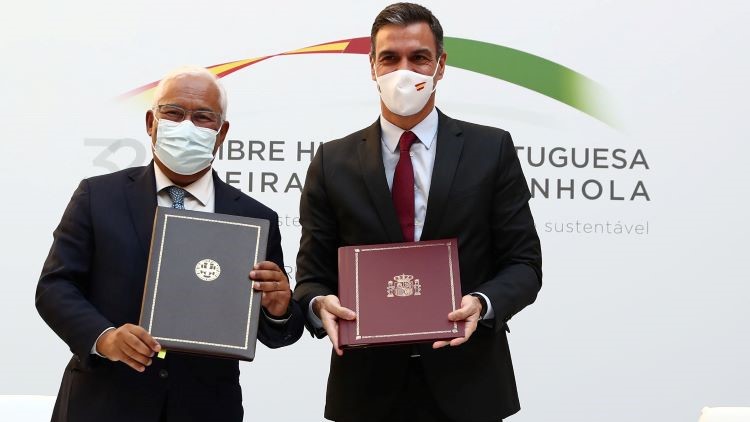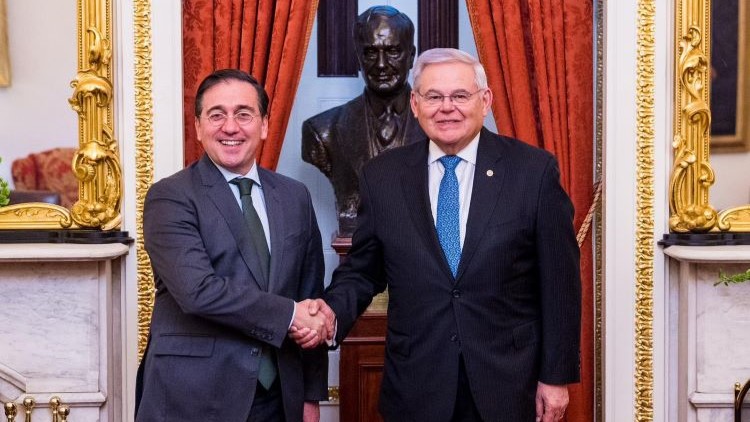The Diplomat
Yesterday came into force the new Treaty of Friendship and Cooperation between Spain and Portugal, whose signing took place in October 2021 during the XXXII Bilateral Spanish-Portuguese Summit, held in Trujillo (Cáceres). The text, which renews the previous treaty of 1977, foresees, for the first time in an international agreement, the holding of annual bilateral summits presided over by the heads of government and promotes cross-border cooperation.
At the XXXI Spanish-Portuguese Bilateral Summit, held on October 10, 2020 in Guarda, the Governments of Spain and Portugal affirmed their intention to update and give shape to “the rich and diverse network of bilateral ties” through a Treaty of Friendship and Cooperation that renews, but does not repeal, the agreement currently in force, signed on November 22, 1977. Once authorized by the Council of Ministers on October 26, 2021, the signing of the treaty took place on October 28, 2021, in Trujillo, by the President of the Government, Pedro Sánchez, and the Portuguese Prime Minister, António Costa.
In a joint communiqué, the governments of the two countries yesterday welcomed the entry into force of the Treaty and stressed that the previous Treaty of Friendship and Cooperation of 1977 “played a fundamental role in the parallel development of Spain and Portugal as democracies”, because it was signed “at an essential moment of democratic transition in both countries” and its adoption “united the two peoples and contributed to the development of relations between Spain and Portugal, both in political, commercial, cultural, scientific and technological terms, among many others”. Likewise, the joint communiqué continues, that treaty “also established the Council for Spanish-Portuguese Cooperation, the origin of what would later become the Spanish-Portuguese Summits.”
“In these more than forty years, both countries and their societies have undergone numerous changes,” the text continues. “Spain and Portugal are now consolidated democracies, Member States of the European Union, NATO allies and partners in the Ibero-American Conference” and, for all these reasons, “the ties between the two countries are today strong and mature, fully consolidated, thus giving rise to the need to develop a new framework that takes into account the evolution of the relationship, its growing density and depth and its strategic and multidimensional nature”.
“In this context, the new Treaty of Friendship and Cooperation affirms the shared values and updates the instruments of cooperation in the most varied fields, both bilateral, including the privileged cross-border relations, as well as European and international,” the communiqué states. Therefore, the entry into force of the Treaty “implies the renewal and dynamization of these relations, adapting them to the circumstances of the present and looking to the future”.
The Treaty
The objective of the agreement is the deepening of cooperation and strategic coordination, including cross-border cooperation and cooperation with outermost regions, in the face of the new challenges of a globalized world, “all oriented towards social justice, welfare and progress of our peoples”. It also reflects the commitment of the two countries “in the European construction embodied by the European Union”, their “Atlantic vocation, which is expressed by their membership in the Ibero-American Community of Nations”, the relations with Africa and the Mediterranean and the defense of multilateralism based on the central role of the United Nations.
The text also defines the instruments of political cooperation and the structures of consultation and cooperation that structure bilateral relations and includes, for the first time in an international agreement, the holding of annual bilateral summits presided over by the Heads of Government, as well as the establishment of a body to follow up on the commitments assumed at the summits. It also provides for annual meetings of the Ministers of Foreign Affairs and Defense, parliamentary cooperation and the promotion of structured mechanisms for dialogue between the two civil societies and social partners.
The agreement also specifies that cross-border cooperation is “one of the fundamental axes of the bilateral relationship” and that, for this reason, the two governments undertake to “give continuity to the existing tools and to promote joint strategies” in this area. In addition, it examines the areas of cooperation in areas such as languages, education and culture; environment, connectivity, energy, science and technology, economy, justice, home affairs and civil protection, public health, labor, employment and social policy and outermost regions.
The Treaty also addresses “the deepening of the European Union” and the possibilities of “joint action at the multilateral level, with special attention to global issues and the regional cooperation frameworks of which they are part, highlighting the Ibero-American Community of Nations and the cooperation bodies in the Mediterranean”.







